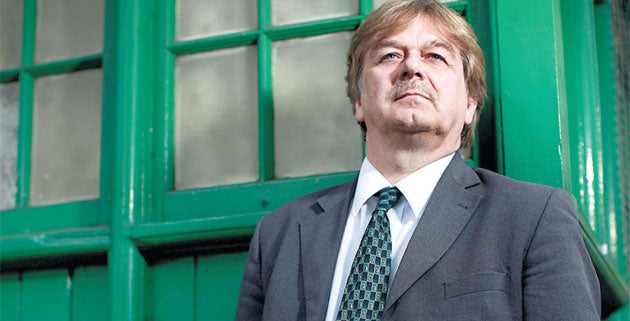Top-level review ordered into sacking of whistle-blower
New Health Secretary promised before election to give better protection to concerned NHS staff 'moles'

The new Secretary of State for Health, Andrew Lansley, has ordered an unprecedented high-level investigation into why a senior NHS manager was sacked for whistle-blowing.
John Watkinson was dismissed from his post as chief executive by the Royal Cornwall Hospital NHS Trust (RCHT) in 2009 following pressure from the Strategic Health Authority (SHA), which oversees the NHS in the South-west.
An employment tribunal ruled last week that the Mr Watkinson was clearly "to be got rid of" after he refused to close a local cancer service without proper public consultation. His resolve to fulfil the legal obligation to consult patient groups was seen as an "irritant" to SHA bosses, determined to move the upper gastro-intestinal cancer service to a larger centre in Devon.
The tribunal panel was highly critical of the fact the SHA chief executive, Sir Ian Carruthers, and chairman, Sir Michael Pitt, were not called by the Trust to give evidence. Several witnesses refused to answer straightforward questions and key documents were also withheld from the tribunal, says the judgment.
Mr Lansley has taken the rare step of asking the most senior figure in the NHS, its chief executive Sir David Nicholson, to investigate the activities of the SHA over the sacking. However, experts claim an independent inquiry is needed to guarantee fairness and transparency. Mr Lansley refused to be drawn on whether a pledge to improve legal protection for NHS whistle-blowers made while in opposition last month would be honoured.
Dr Peter Gooderham, a whistle-blowing expert from Manchester University's Law School, said: "Following the Stafford scandal we were repeatedly told by ministers that whistle-blowers enjoy complete legal protection. This case is the latest which shows this to be untrue. It should be an inquiry headed by a demonstrably independent person given the seniority of Sir Ian."
John Watkinson had dedicated his life to the NHS, joining it as a store man at 19 before working his way up to chief executive by the age of 35. He was headhunted for the Cornwall job while chief executive of the struggling Bromley NHS Trust in south London. When he moved his family to Cornwall in January 2007, the hospital had been rated the "worst performing trust" by the health watchdog after several management changes, spiralling debt and a failure to meet performance targets.
Mr Watkinson's team made good progress within the first year. Morale improved, waiting time targets were met and financial woes began to ease. It was voted the "most improved trust" of 2008. So what went wrong?
In 2001, the Department of Health issued guidance for improving the survival rates for cancer patients. Upper GI cancer is rare and outcomes are better if specialists treat at least 50 patients a year. As a result, the SHA wanted to transfer the small Cornwall service to Devon.
But there is a legal obligation to consult local people before such changes are made. The tribunal ruled that Mr Watkinson was sacked by the Trust because he refused to bow down to SHA pressure on this issue. It rejected the assertion made by the Trust that he was dismissed because of reported failings at his previous job or a breakdown of trust and confidence in his leadership.
The tribunal judgment said "his dismissal flew in the face of any concept of fairness" and stated the "appeal was a travesty of anything approaching basic concepts of fairness."
The SHA denies exerting pressure on the Trust board. A RCHT spokesperson said: "We contest the judgment of the Tribunal and are considering an appeal. We welcome the fact that the new Secretary of State for Health has asked the NHS chief executive to review these matters and we look forward to setting the record straight."
Speaking exclusively to the IoS, Mr Watkinson has described his dismay at being forced out of the NHS after 34 years of continuous service. He gave a warning about a pervasive bullying culture faced by NHS staff which threatens patient care.
He said: "I've been booted out at a time when surely experienced people like me are most needed. That makes me very sad. I love the NHS and I'd like to go back, but you can't meet tough financial targets and keep clinical standards up by bullying people."
His legal fees thus far are about £200,000. Unemployed at the age of 54, his house is up for sale. "I would much rather be in work, but they have damaged my reputation so badly, that I've not been able to get another job. The public have a right to know how much money has been spent on kicking me out of the NHS unfairly," he said.
"This wasn't the way I should have gone out of the NHS. I wasn't expecting a band, but I wasn't going to accept being booted out like this, not after 34 years, with a good record in tough places. Yes I won, but it has cost me a lot of money and it's a terrible way for it to end."
Subscribe to Independent Premium to bookmark this article
Want to bookmark your favourite articles and stories to read or reference later? Start your Independent Premium subscription today.

Join our commenting forum
Join thought-provoking conversations, follow other Independent readers and see their replies